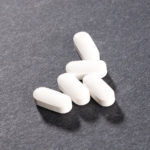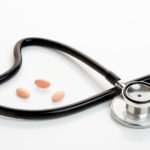By David Blyweiss, M.D., Advanced Natural Wellness
July 05, 2013
- Another black eye for the FDA
- What Merck won’t tell you about their new drug
- Safer alternatives to lowering cholesterol
I’m not always happy about decisions made by the FDA. But their recent approval of the new drug Liptruzet has my head spinning.
This drug is combination of the atorvarstatin (generic Lipitor) and the controversial cholesterol-lowering drug known as ezetimibe (Zetia.)
Each of these drugs lowers cholesterol by a different action. Atorvastatin reduces production of cholesterol in the liver while ezetimibe inhibits absorption of it in the digestive tract.
And I already have patients asking for it. They like the idea of a “double-action” cholesterol lowering med.
But that’s not the shocking news.
Open your arteries, improve blood flow for a new health miracle...
Did you know your circulatory system has over 60,000 miles of arteries, veins and other blood vessels, if stretched end to end?
But as you age, your blood vessels undergo changes, which may cause them to stiffen, thicken and get clogged.
GOOD NEWS! Doctors have now identified a “Miracle Molecule” inside your arteries that helps OPEN your arteries and IMPROVE blood flow.
It’s what Dr. Valentin Fuster calls it, "One of the most important discoveries in the history of cardiovascular medicine."To you, that means...
- Healthy blood pressure
- Sharper mind and memory
- Skyrocketing energy and muscular strength
- Increased pleasure and passion in the bedroom
- Improved circulation to every cell and organ in your body
Go here to discover a new natural way to significantly boost the levels of this miracle molecule in YOUR body NOW!
First, you should know this type of a formula isn’t new, by any means. It’s a marketing-ploy.
You see, there’s already a similar drug on the market. And it’s made by the same manufacturer, Merck. It’s called Vytorin, a combination of simvastatin (generic Zocor) and ezetimibe.
Second, there has been a lot of bad news about ezetimibe. And that bad news is just as relevant to the new drug, Liptruzet. Just wait until you hear what it does to you…
In just the past few years, researchers have identified numerous health threats associated with statin drugs. They’ve been linked to an increased risk of diabetes, memory loss, muscle damage, arterial plaques and cataracts.
But I admit. Statin drugs really do decrease LDL cholesterol. And so does ezetimibe.
However exetimibe comes with a serious health risk of its own. And Merck would rather you not know about it.
While it may lower LDL cholesterol, it has a horrible effect on your arteries.
Are You Suffering From...
- Love handles and a pot belly
- Romance that isn't what it used to
- Forgetfulness and inattention
- Low (or no) strength and endurance
- A sex drive that's shifted into neutral...or worse
If so...you may have Mature Male Burnout. Click here to discover more about this unique condition and what you can do about it.
You see, instead of helping to clear them out and increase blood flow it actually leads to atherosclerosis – hardening of the arteries!
In November, 2009 (yes, back in 2009), a shocking study appeared in the New England Journal of Medicine. It’s called the ARBITER 6-HALTS study. And the authors say the reproducibility of their results are the highest ever achieved in a clinical trial.
Here’s what happened…
Coronary heart disease patients who were long-term statin users were randomly assigned to receive niacin or ezetimibe.
While both treatments helped lower LDL cholesterol, the researchers discovered a paradox when it came to ezetimibe.
The more it lowered levels of LDL cholesterol, the thicker the patient’s arteries became. And the longer subjects took it, the greater the degree of atherosclerosis!
Now the whole idea behind lowering LDL cholesterol is to improve the health of the arteries and reduce atherosclerosis, not to make them worse.
But that’s not the only bad news about ezetimibe. Nine people in this group had a major cardiac event and five people died during the 14 month study.
When you compare this with the niacin group, niacin was the winner all the way around. Niacin reduced arterial plaque by 2%. Only two people had a cardiac event and one person died. Plus, niacin increased good HDL cholesterol by over 18%.
The results were so overwhelming that the researchers halted the study just 14 months into it. But it’s going back on the market.
There are much safer and more effective ways to reduce your cholesterol levels and protect your heart. Here’s what you can do…
You can see why it’s so difficult for me to understand why the FDA approved Liptruzet.
If you really want to get your cholesterol levels where they should be, try this…
- Supplement with policosanol and niacin. In studies, 10 to 20 mg of policosanol daily raises HDL cholesterol by 8% to 15%. It also reduces LDL by up to 29%. And niacin can increase HDL by as much as 35%. I suggest 20 mg. policosanol and 250 mg. of niacin.
- Take a combination of fish oil and red yeast rice. When researchers compared a combination of fish oil, red yeast rice and lifestyle changes against the statin drug Zocor, guess which one won? While both treatments lowered LDL levels, the fish oil and red yeast rice also decreased triglyceride levels by 29%. That’s something the statin couldn’t do. As an added bonus, the fish oil and red yeast rice combo also resulted in a 5.5% drop in weight. I recommend 1,200 mg of red yeast twice a day along with 3,000 mg of a high quality fish oil supplement.
- Don’t forget to take your CoQ10! If you are taking a statin drug, it’s absolutely ESSENTIAL to supplement with CoQ10. But I recommend it to everyone because it provides the cellular energy your heart, muscles and other organs need to function properly. Look for the most bio-available form available. It’s called “ubiquinol.” Just 100 mg. a day can protect and preserve your heart health.
- Go Mediterranean. A recent study shows that people who eat a Mediterranean diet high in olive oil and nuts can reduce the risk of a cardiovascular event by 28 to 30%. Just add about 1.7 ounces of olive oil a day to the foods you eat. And it only takes about 30 grams of nuts each day to provide maximum protection for your heart. Try pecans, walnuts, Brazil nuts and pistachios.
- Get moving. According to the Mayo Clinic, you can increase good (HDL) cholesterol by about 5% in only two months with brisk exercise. I suggest 30 minutes twice a day. And it doesn’t have to be hard. All you have to do is walk, run, swim or ride a bike to gain the benefits. And don’t forget to add bursts of intensity. You’ll be better off for it.
These are some great heart-healthy alternatives to potentially dangerous cholesterol-lowering drugs. So don’t wait to get started.
References
Taylor AJ, et al. Extended-release niacin or ezetimibe and carotid intima-media thickness. N Engl J Med. 2009 Nov 26;361(22):2113-22. Epub 2009 Nov 15.
Gouni-Berthold I, Berthold HK. Policosanol: clinical pharmacology and therapeutic significance of a new lipid-lowering agent. Am Heart J. 2002 Feb;143(2):356-65.
Becker, D. et al. Simvastatin vs therapeutic lifestyle changes and supplements: randomized primary prevention trial. Mayo Clinic Proceedings. 2008; 83: 758-764.
Universitat de Barcelona (2013, February 25). Mediterranean diet helps cut risk of heart attack, stroke: Results of PREDIMED study presented. ScienceDaily. Retrieved May 17, 2013, from http://www.sciencedaily.com






